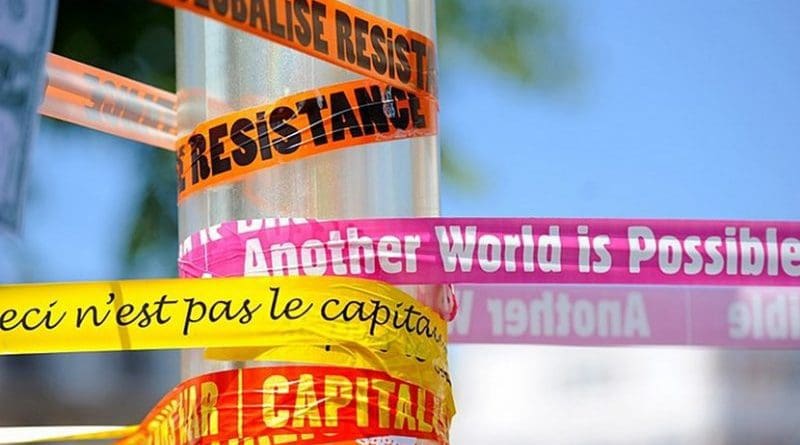On Illegal Globalization, Or Can Globalization Ever End? – OpEd
In today’s far from simple world, many economists and representatives of other social sciences are concerned about the possibility of a completion of globalization. Some believe that globalization is already dead.
Since the COVID-19 pandemic, and especially after Russia started the war in Ukraine in February 2022, followed by the imposition of economic sanctions by the West against Russia, there has been more and more talk about the beginning of “deglobalization.” And this is not at all surprising, given the disruptions to global supply chains chains that have caused shocks in the international trade system which was developed over many years.
No less important in shaping the view of the beginning of deglobalization was the trade confrontation between the United States and China which began during the presidency of Donald Trump and which has intensified during the presidency of Joe Biden.
In order to recognize the possibility of deglobalization, which will eventually lead to isolationism, it is necessary to answer the question of the fundamental possibility of the end of globalization.
The main arguments in favor of globalization, as a rule, are the interconnectedness of the world and the fact that no one region is self-sufficient.
When talking about globalization and its problems, experts tend to confine themselves to considering only the legal part of the world’s economy, leaving out the illegal side of globalization. This approach is half-hearted.
The fact is that illegal economic activity, in many cases (for example, in drug trafficking or the illegal arms trade), is not limited to the framework of national states alone, and has a definite international character. So, despite the international nature of the fight against the drug business with the involvement of Interpol, this sector of the illegal economy has a clearly defined global character.
Illegal businesses use all global communication channels to find loopholes in order to circumvent the economic sanctions adopted by the West against Russia. These sanctions are incomplete due to these obvious holes. Firstly, many countries (among them China, India, Israel, and Turkey) have not joined these sanctions, and, secondly, some European countries have become so dependent on Russian oil and gas that, despite the sanctions, they continue to buy them from Russia.
Russia uses companies from countries that have not joined the economic sanctions for illegal business operations, so as to circumvent the economic sanctions.
It is a sad fact that some European countries, which at one time officially introduced or at least supported economic sanctions against Russia, are now involved in the illegal purchase of Russian oil, its processing and resale as corresponding oil products. These countries include Latvia, the UK, Germany, Belgium and the Netherlands.
In order to circumvent the economic sanctions, Russia is showing more and more interest in using cryptocurrencies for illegal money transfers.
All of these facts of Russia’s avoidance of economic sanctions testify to the fact that globalization has not disappeared: It exists, and, despite the desire of Western politicians to significantly clamp down on Russia’s economy with these sanctions, Russia still manages to at least partially work around them.
Russia’s experience avoiding the Western economic sanctions most clearly indicates the discrepancy between the level of political globalization and the level of economic globalization. The well-known Polish economist Grzegorz Kołodko rightly pointed this out, noting that the level of economic globalization is much higher than political globalization, which creates the illusion of the beginning of deglobalization.
One of the clearest examples of the discrepancy between the level of political globalization and the level of economic globalization is the US-Chinese geopolitical confrontation, as a result of which antidrug cooperation suffers, and the corresponding illegal business continues to operate on a global scale.
Thus, we are not dealing with the death of globalization, but with the completion of hyper-globalization. The above examples of illegal economic globalization indicate that we are dealing not with deglobalization, but with pseudo deglobalization.
With the onset of the COVID-19 pandemic, hyper-globalization was replaced by turbulent globalization, and after the outbreak of the Russian war in Ukraine and the adoption of economic sanctions by the West against Russia, the world was engulfed by confrontational globalization.
After the end of the Russian war in Ukraine and the lifting of economic sanctions against Russia by the West, the world will move in the direction of a “better” globalization, which, in my opinion, will take into account the requirements of economic security.
With economic security, energy security and food security become a priority. Equally important is the creation of more resilient networks of global supply chains.
The current measures of “reshoring” or “onshoring” (repatriation of enterprises located in distant countries), “nearshoring” (relocation to the neighboring countries of enterprises located in distant countries), and “friendshoring” or “allyshoring” (relocation of enterprises from distant countries to those countries that adhere to similar values) are forced measures to ensure economic security in the face of confrontational globalization. Obviously, these measures are a departure from the free trade regime and will directly affect the increase in the cost of production. However, these measures are indispensable when pitted against the frequent disruptions to global supply chains.
But even reshoring, nearshoring and friendshoring do not mean the disappearance of globalization, since it is an objective process which is most clearly manifested in examples of illegal globalization.
One of the modern challenges for economists is to study the features of globalization with economic security, in order to be able to correctly assess the current reality in the world’s economy.

